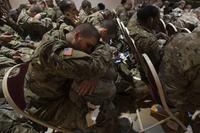NIMRUZ PROVINCE, Afghanistan — As the early morning sun peeks over the mountains the Nimruz province of Afghanistan, the Marines and sailors with Charlie Company, 1st Battalion, 8th Marine Regiment, began an operation in the Gostan Valley.
The Marines staged their vehicles at the top of the hills overlooking Gorozan, the first village they were set to clear. As a show of force and for added protection, tanks with 1st Tank Battalion watched from a distance as Charlie Company cleared the small village.
“Charlie Company, 1st Bn., 8th Marines, has been tasked with clearing the Gostan Valley where Washir is located, which is a known insurgent bed-down location,” said 2nd Lt. Michael Steadman, platoon commander, 3rd platoon, Charlie Company, 1st Bn., 8th Marines. “This is where the insurgents like to come to, so this operation was meant to be offensive in nature. We wanted to take the fight to the enemy in a place where they traditionally feel like it’s safe.”
The Marines searched every compound of Gorozan. They were looking for any evidence of insurgents, weapons or improvised explosive device-making components.
Less than an hour into the operation, the sounds of explosions and gunfire could be heard off in the distance.
“Sounds like it’s starting to get crazy over there,” one Marine said to another as they searched one of the compounds.
The shots came from other platoons with Charlie Company in a separate compound a few miles away.
Throughout the operation, the Marines and sailors walked through rocky mountains, poppy fields and empty water beds. Moving through that type of terrain with the equipment an infantry Marine carries can be a challenge.
“I was carrying the M249 Squad Automatic Weapon, 700 rounds, six extra rifle magazines, a spare barrel, green smoke grenades and enough food and water for two days.” said Lance Cpl. Frank Young, SAW gunner, 3rd squad, 3rd platoon, Charlie Company, 1st Bn., 8th Marines. “I was just thinking about finding a spot to cover the squad if needed and praying to God that everyone came home in one piece.”
After walking for more than 10 hours in 90-degree weather with the added weight of their protective equipment, weapons, and other necessities, the Marines left the village which was abandoned by the insurgents and headed back to their vehicles.
“We’ve been working hard nonstop, but that’s what comes with being a Marine. You just kind of have to suck it up,” Steadman, from College Station, Texas, said. “Operational tempo is fairly intense. The days kind of just rolled together, really, from driving all through the night to conducting our own clearing operations. We went 72 hours with no sleep while still conducting these operations. But the Marines have done a good job looking out for each other and resting when they can.”
The little sleep any of the Marines received was at night in the back of vehicles while moving to their next objective.
On the second day of the operation, Charlie Company began clearing Keshawar village. Although the insurgents had fled, the Marines and sailors found a room filled with weapons, IED-making materials and booby traps designed to explode upon entry.
“I’m not going to lie, I was scared to death.,” said Petty Officer 3rd Class Matthew Sears, corpsman, 3rd platoon, Charlie Company, 1st Bn., 8th Marines, who was one of the first people to walk into the room. “When I was doing the IED lane training I thought to myself, ‘When is a corpsman going to need to know what an IED looks like?’ I guess I found out.”
Although some of the Marines were in the immediate area when the IED was found, it was not properly connected and didn’t explode. The Marines called for an explosive ordinance disposal unit to come and take care of the IEDs and weapons found.
As the sun set on the second day, the Marines and sailors began the trip to their next objective, knowing, once again, that the only sleep they would get would be in the back of moving vehicles.
“A lot of people always say they do it for their family, they do it for their country, they do it for the people back home. But in the end we do it for the guys next to us because that’s all you have when (stuff) hits the fan,” said Cpl. Jeffrey Andrews, a team leader, 3rd squad, 3rd platoon, from Elmira, N.Y. “Everybody has a job to do to help everybody get home together, and if that means you have to go on little sleep or little to no food or water, then you just have to keep going that much harder to keep the guys that are following you in the game.”
On day three, Charlie Company cleared the village of Fulad. Although they were tired from nearly three days of constant walking and facing the dangers of combat, the Marines kept going to complete the mission.
In Fulad, Marines found people from other villages who were kicked out by the insurgents. Again, the Marines learned insurgents had fled when they heard the Marines were coming.
As the first part of their clearing operation drew to an end the Marines were finally able to get a full night’s sleep at the end of the third day. Exhausted and lying side by side in their sleeping bags, laughter and jokes could be heard coming from an abandoned compound where the Marines found shelter. They joked about previous deployments, laughed about funny moments during this one and talked about the dangers they faced over the past several days.

























